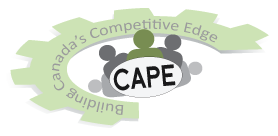INTRODUCTION AND RATIONALE.
Based on an analysis of our member inventory created over the last decade (May 2004 – to date) the following is the present employment position of our membership comprising 3952 immigrants with engineering backgrounds.
| Number of years of Engineering Experience | Percentage | Employment Status | Percentage |
| 0 to 10 | 52.6% | Not working | 62.3% |
| 11 to 20 | 36.4% | Working in Professional field | 14.1% |
| > 21 | 11.0% | Working, but in another field | 23.6% |
Since 1986 the Canadian immigration policy has encouraged and invited immigrants with international professional qualifications and experience to this country. CIC (Citizenship and Immigration Canada) data indicates that between the years of 1994-2000, 75,283 immigrants who came to Ontario identified themselves as belonging to a regulated profession. Of this total, 39,411 (52%) identified themselves as engineers; a further 15,144 identified themselves as engineering technicians and technologists (bringing the total to 54,544, or 73%). Engineers have represented the largest occupational group of skilled workers immigrating to Ontario over the last two decades.
The Canadian situation is unique as a major experiment in the immigration of an increasingly diverse population with very diverse skills and educational backgrounds. The barriers to recognition of credentials and experience of immigrant professionals and trades-people, either by regulatory bodies or employers, and the dramatic under-utilization of their skills and experience has become an increasingly urgent issue in Canada. Canada continues to be disturbingly ineffective in integrating these highly-skilled and educated newcomers into the professional workplace.
Against this backdrop CAPE Council for Access to Profession of Engineering:
- Represents the largest collective voice of these immigrants with engineering and other professional backgrounds
- Advocates fair, transparent and accountable practices in employment, training and licensing of engineers and other professionals in Canada
- Has developed and made public position papers and submissions contained in this section in consultation with its membership and community coalition to bring about informed public awareness of this issue
